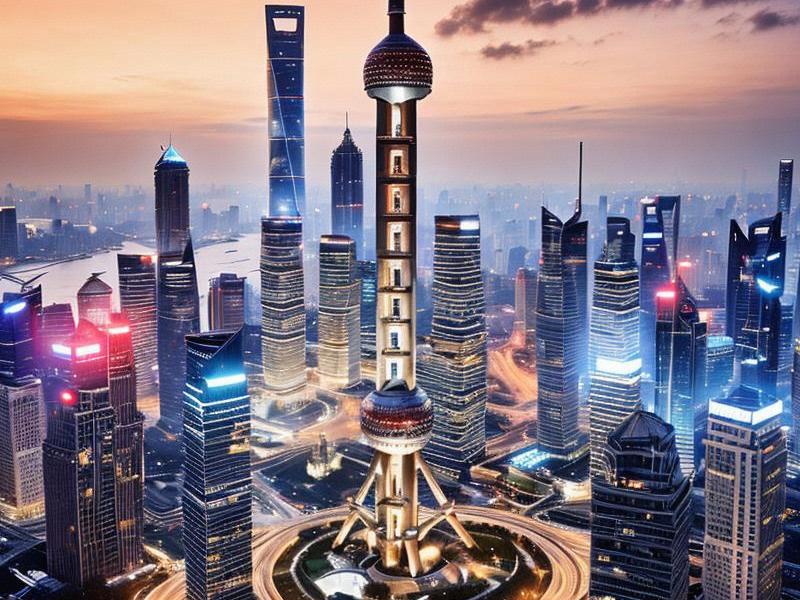
Shanghai, the largest city in China and one of the world's most dynamic metropolises, has long been a symbol of China's rapid economic growth and modernization. Over the past few decades, Shanghai has transformed from a traditional port city into a global financial hub, a center for innovation, and a vibrant cultural destination.
The urban development of Shanghai is nothing short of remarkable. The city's skyline has been reshaped by a series of iconic skyscrapers, including the Oriental Pearl Tower, the Jin Mao Tower, and the Shanghai Tower, which stands as the tallest building in China and the second-tallest in the world. These architectural marvels are not just symbols of Shanghai's economic prowess but also reflect the city's commitment to modernization and innovation.
The Bund, once a symbol of colonial Shanghai, has been revitalized into a vibrant waterfront area with luxury hotels, restaurants, and cultural attractions. Pudong, on the other side of the Huangpu River, has emerged as the financial and commercial heart of the city, home to the Shanghai Stock Exchange, the World Financial Center, and the upcoming Lujiazui Financial City.
Innovation is at the core of Shanghai's development strategy. The city has established itself as a global hub for technology and innovation, attracting top talent and investment from around the world. Zhangjiang Hi-Tech Park, one of the largest and most influential technology parks in China, is home to numerous high-tech companies, research institutions, and startups. It has become a breeding ground for innovation, fostering advancements in fields such as artificial intelligence, biotechnology, and information technology.
上海龙凤阿拉后花园 Shanghai's commitment to innovation is also evident in its efforts to promote digital transformation and smart city initiatives. The city has invested heavily in infrastructure, including 5G networks, intelligent transportation systems, and digital platforms, to enhance the quality of life for its residents. Smart technologies are being integrated into various aspects of urban life, from public services to energy management, making Shanghai a model for smart city development.
The global influence of Shanghai continues to grow as it plays a pivotal role in international trade, finance, and diplomacy. As a founding member of the Asian Infrastructure Investment Bank (AIIB) and a key player in the Belt and Road Initiative, Shanghai is at the forefront of China's efforts to strengthen global economic cooperation. The city's free trade zone, established in 2013, has become a testing ground for trade and investment liberalization, attracting businesses from around the world.
Culturally, Shanghai is a melting pot of tradition and modernity. The city is renowned for its rich history, with landmarks such as the Yu Garden, the Yuyuan Bazaar, and the former French Concession showcasing its colonial past. At the same time, Shanghai is a hub for contemporary art, fashion, and cuisine, attracting artists, designers, and food enthusiasts from around the globe.
The economic transformation of Shanghai is a testament to the city's resilience and adaptability. Once a manufacturing powerhouse, Shanghai has successfully transitioned into a service-oriented economy, with finance, trade, and technology emerging as key drivers of growth. The city's strategic location on the eastern coast of China, coupled with its well-developed infrastructure and business-friendly environment, makes it an attractive destination for foreign investment.
上海龙凤阿拉后花园 Shanghai's economic transformation is also reflected in its efforts to promote sustainable development. The city has set ambitious targets to reduce carbon emissions, improve air quality, and enhance environmental sustainability. Initiatives such as the construction of green buildings, the promotion of renewable energy, and the development of public transportation systems are helping Shanghai to achieve its sustainability goals.
The people of Shanghai are at the heart of the city's success. With a population of over 24 million, Shanghai is a cosmopolitan city that embraces diversity and innovation. The residents of Shanghai are known for their entrepreneurial spirit, adaptability, and passion for life. The city's vibrant cultural scene, with its theaters, music festivals, and art galleries, reflects the rich tapestry of its population.
Education is another area where Shanghai has made significant strides. The city is home to some of the best universities in China, including Fudan University, Tongji University, and East China Normal University. These institutions are not only centers of academic excellence but also play a crucial role in fostering innovation and talent development.
爱上海419 Tourism is a major contributor to Shanghai's economy, attracting millions of visitors each year. The city's attractions range from historical landmarks to modern attractions, offering something for everyone. The Shanghai Museum, the Shanghai Natural History Museum, and the Shanghai Urban Planning Exhibition Center provide insights into the city's history and culture, while the Shanghai Disneyland and the Shanghai Ocean Aquarium offer entertainment and family-friendly experiences.
Shanghai's future looks bright as it continues to evolve and adapt to the changing global landscape. The city's leadership is committed to maintaining its position as a global leader in innovation, finance, and culture. With ongoing investments in infrastructure, technology, and education, Shanghai is well-positioned to meet the challenges of the future.
In conclusion, Shanghai is a dynamic metropolis that embodies the spirit of China's modernization and globalization. Its remarkable urban development, commitment to innovation, growing global influence, and ongoing economic transformation make it a city of endless possibilities. As Shanghai continues to rise on the horizon of global innovation, it serves as a beacon of hope and inspiration for cities around the world.
